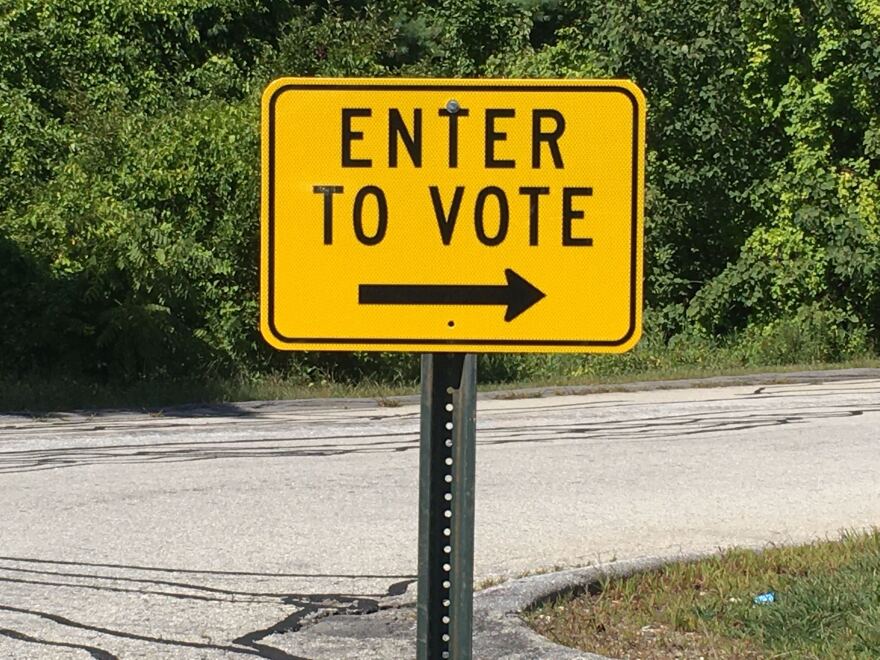COVID-19 made this month’s primary election in New Hampshire unlike any other. Voters case ballots wearing masks and voting in person or absentee, and election workers added “staying safe from infection” to their list of things-to-do while making voting easy for their fellow community members.
With the general election less than two months away, we wanted to know what lessons the state took away from this unusual primary that might be useful in November. NHPR's Peter Biello spoke with Assistant Attorney General Nicholas Chong Yen.
2020 Elections Guide: How to Vote Absentee or At The Polls During COVID-19
Sign up for NHPR's newsletters for more New Hampshire news stories.
What, if anything, happened on Election Day that you didn't anticipate, something that might make the state adjust its approach to the general election in November?
I think what we're going to be doing is making sure there's additional training surrounding the modifications that have been made temporarily for election operations at the polls. There were some questions that had come in from both voters and officials just wanting clarification about how certain operations were being conducted. There were questions, for example, about the use of a separate voting area for those that were unable or unwilling to wear a mask and having a polling place that had a mask requirement. So that is one of the things that we're continuing to work with election officials on in addressing an expectation for November. But I think the important thing to understore about the state primary is just how successful it ultimately was. Our officials were incredibly diligent in trying to prepare for the September primary. So we owe them a sincere debt of gratitude because of the sheer volume of additional things on top of all the other jobs that they have to commit to for the success of the September primary.
According to your office, there were no significant issues regarding mask use, although you did receive some complaints regarding the wearing of masks. Some election officials have told your office that they'd feel more comfortable having a statewide standard for mask use at polling places to take the pressure of individual election officials or volunteers. Is that something you're considering?

Our role as an enforcement authority is to enforce the laws that currently exist as well as working with our officials to help them navigate these unique challenges as a result of COVID. In terms of a statewide mask mandate, that wouldn't be within that purview, but we are continuing to work with our officials to help them tackle these unique challenges. And so, like we've done before the September primary, we are always available to discuss questions that might come up in conjunction with the Secretary of State, and make sure that officials are as prepared for the November elections as possible.
Overall, what kind of worries or questions are you hearing from the public?
One of the things we took away from the state primary was that anyone who wanted to vote was able to vote and do so in a way that was conducted safely and in fully realizing their ability to exercise their constitutional right to vote.
Your office told NHPR that you received about 10 calls on primary day related to absentee ballots that weren't received in time for the primary. You just mentioned that anybody who wanted to cast a ballot was able to successfully do so. What about those 10 people who believed that their absentee ballots didn't come in in time for the primary? Were those people successfully able to cast their ballot?
One of the things we have to be mindful of is, there is a statute that imposes a cutoff time for receipt for completed absentee ballots on election day for 5 p.m. So election officials cannot receive absentee ballots after that cutoff time. That's something that existed before COVID-19 and continues to be a requirement that we have to follow in both the state primary and the November general election.
With respect to those absentee ballots that had arrived after the cutoff time, election officials correctly followed the law in making sure that the 5 p.m. cutoff time was observed.
And did you observe any election problems related to the Postal Service, or ballots not being delivered because of problems with the Postal Service?
We didn't receive any reports with respect to the Postal Service. One of the things that I think bears emphasizing is the sheer volume of absentee ballots that were received prior to election day, which officials worked diligently to process to make sure all the ballots had been received from voters and that absentee ballots were properly processed and counted.
And if the general election goes as well as the primary, should New Hampshire consider making the broader access to absentee voting a regular thing and not just something special during a pandemic?
The absentee ballot process is a function of our constitution and recognizes specific categories of how that process is carried out. And so I think we've done a really great job of making sure that those individuals who would like to vote during the public health crisis have been able to vote, providing not only the access to the absentee voting process but voting options at the polls on election day. That is certainly going to be something that, I think, can be a topic of discussion following the November election. But for now, we're really focused on making sure election officials are prepared as possible to facilitate the November election.
_________________
Editor's Note: What has your voting experience been like during COVID-19? Do you have questions about casting a ballot that we didn't address here? Send them to elections@nhpr.org and we'll try to report back with answers or incorporate them into this voting guide.








